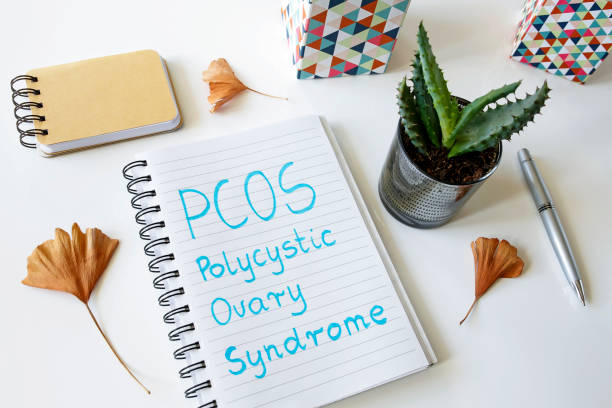4 Types of PCOS
4 types of PCOS is a multi-layered endocrine confusion that influences countless ladies around the world. Described by hormonal unevenness, ovarian brokenness, and metabolic abnormalities, PCOS presents in different structures, making it a test to analyze and oversee successfully. Lately, specialists have recognized four types of PCOS, each with unique qualities and suggestions for ladies’ well-being. We will look into the 4 Types of PCOS, revealing insight into their clinical elements, symptomatic rules, and potential treatment draws.

Type 1: Exemplary PCOS
Exemplary PCOS is the most generally perceived and concentrated type of disorder. It is portrayed by unpredictable periods, anovulation, and the presence of ovarian sores. Ladies with exemplary PCOS frequently display raised degrees of androgens, for example, testosterone, prompting side effects like hirsutism (over-the-top hair development), skin inflammation, and male-design sparseness. The demonstrative rules for exemplary PCOS typically incorporate the Rotterdam standards, requiring the presence of something like two out of three variables: oligoovulation or anovulation, clinical or biochemical indications of hyperandrogenism, and polycystic ovaries on ultrasound.
Therapy for exemplary PCOS frequently includes a blend of lifestyle changes, like eating routine and exercise, and clinical interventions. Oral contraceptives are regularly recommended to control monthly cycles and oversee androgen-related side effects. Also, anti-androgen medications might be utilized to address explicit side effects like hirsutism. Way of life changes, including weight, are pivotal for working on metabolic results in ladies with exemplary PCOS.
Type 2: Ovulatory PCOS
Ovulatory PCOS addresses a subtype where ladies might encounter regular feminine cycles despite fundamentally polycystic ovaries. Perseverance persists in this sort of hormonally awkward nature; however, the trademark highlight is the shortfall of anovulation. While these ladies might have fewer conceptive difficulties than those with exemplary PCOS, they face potential richness issues, as their hormonally awkward nature can influence the nature of ovulation.
Diagnosing ovulatory PCOS can be challenging, as customary rules may not wholly catch the nuances of this subtype. Hormonal profiling and high-level imaging procedures might be essential to recognize fundamental hormonal dysregulations, like raised luteinizing chemical (LH) levels.
Treatment for ovulatory PCOS frequently centers around tending to explicit side effects and enhancing richness. Ovulation-instigating prescriptions, for example, clomiphene citrate or letrozole, might be recommended to improve origination possibilities. Checking the feminine cycle through basal internal heat levels or hormonal markers is significant for distinguishing the fruitful window in women with ovulatory PCOS.
Type 3: Non-Androgenic PCOS
Non-androgenic PCOS, otherwise called “lean PCOS,” challenges the regular view of PCOS as exclusively an androgen-driven jumble. This subtype is characterized by the nonappearance or negligible presence of androgen-related side effects, like hirsutism or skin inflammation. Ladies with non-androgenic PCOS frequently present with metabolic aggravations, including insulin resistance and weight gain.
Diagnosing non-androgenic PCOS might require a more nuanced approach, with an emphasis on metabolic markers and hormonal unevenness. Raised insulin levels, disabled glucose resistance, and unusual lipid profiles are regular highlights in this subtype.
Treatment for non-androgenic PCOS focuses on tending to metabolic irregularities. Way of life alterations, including dietary changes and standard activity, are essential in overseeing insulin obstruction and advancing weight reduction. For example, metformin, an insulin-sharpening specialist, might be endorsed to work on metabolic results. Furthermore, hormonal contraceptives can assist with directing feminine cycles in ladies with non-androgenic PCOS.

Type 4: Gentle PCOS
Gentle PCOS addresses a subtype described by the presence of less and less serious side effects compared with exemplary PCOS. Ladies with gentle PCOS might have sporadic feminine cycles, gentle rises in androgen levels, and fewer ovarian growths. This subtype frequently presents an indicative quandary, as the side effects might be inconspicuous, and customary measures must be met entirely.
Diagnosing gentle PCOS requires an exhaustive assessment of clinical and research center discoveries. Hormonal profiling, pelvic ultrasound, and an extensive evaluation of side effects are fundamental in recognizing gentle PCOS from other regenerative or endocrine circumstances.
Treatment for gentle PCOS is customized to the person’s particular side effects and conceptive objectives. Way of life alterations, including diet and exercise, remain central to overseeing gentle PCOS. Fruitfulness-centered mediations, for example, ovulation-instigating prescriptions, might be considered for ladies trying to imagine. Customary observation and a customized way to deal with care are vital in tending to the remarkable requirements of ladies with gentle PCOS.
Final Words about 4 Types of PCOS
The order of PCOS into unmistakable subtypes addresses a critical progression in how we might interpret this mind-boggling disorder. Perceiving the variety inside PCOS empowers medical care suppliers to offer more customized and designated medications, taking into account the particular side effects and hidden hormonal awkwardness in each subtype.
While the 4 types of PCOS give structure to order, it is fundamental to recognize the cross-over and heterogeneity seen in clinical practice. Ladies with PCOS might show elements of different subtypes, featuring the unpredictable exchange of hereditary, hormonal, and natural variables in the appearance of this disorder.
Pushing ahead and proceeding with research is essential to refine our arrangement frameworks, work on indicative exactness, and improve treatment results for ladies with PCOS. An all-encompassing and patient-focused approach, coordinating way of life changes, clinical mediations, and conceptive preparation, is fundamental in tending to the diverse ideas of PCOS and working on the general well-being and prosperity of impacted people. This is all about 4 Types of PCOS.

FAQs about 4 Types of PCOS
What are the essential side effects of four types of PCOS?
A range of side effects describes PCOS, and the results can differ among people. Typical side effects incorporate sporadic feminine cycles, anovulation (absence of ovulation), and the presence of ovarian sores. Raised androgen levels can prompt side effects like hirsutism (unnecessary hair development), skin breakout, and male-design sparseness. Metabolic aggravations, including insulin resistance and weight gain, are also predominant.
How is PCOS analyzed, and are there explicit tests for each subtype?
PCOS determination ordinarily includes clinical assessment, clinical history, and demonstrative tests. The Rotterdam models, which incorporate two out of three variables (oligoovulation or anovulation, indications of hyperandrogenism, and polycystic ovaries on ultrasound), are regularly utilized. Explicit tests for each subtype may incorporate hormonal profiling, imaging methods like pelvic ultrasound, and metabolic appraisals to distinguish insulin obstruction or other metabolic anomalies.
What are the treatment choices for PCOS, and would they say they are different for each subtype?
Treatment for PCOS plans to oversee side effects, manage feminine cycles and address hidden hormonal and metabolic lopsided characteristics. Way-of-life alterations, including diet and exercise, are essential for all subtypes. Clinical intercessions might incorporate hormonal contraceptives, hostile to androgen prescriptions, insulin-sharpening specialists like metformin, and ovulation-instigating drugs. While the expansive standards of treatment apply to all subtypes, explicit mediations might be custom-fitted in light of the person’s overwhelming side effects and objectives.
How does PCOS influence ripeness, and what are the choices for ladies to consider?
PCOS can fundamentally influence richness because of unpredictable ovulation. Ladies with PCOS might encounter difficulties imagining. Fruitfulness-centered intercessions frequently incorporate ovulation-instigating prescriptions, for example, clomiphene citrate or letrozole. Way of life alterations to work on general well-being, weigh the executives, and check feminine cycles are urgent for improving fruitful results. In additional complicated cases, conceptive advances (workmanship) like in vitro treatment (IVF) might be considered.
